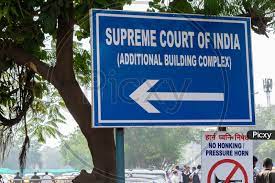The petitioner prays for issuance of a writ of mandamus and/or for an appropriate Digitally signed by writ/order or direction in the nature of mandamus, directing the Delhi Cantonment Board (hereinafter referred to as, ‘the DCB’) to de seal the subject property i.e., CB-97, Naraina Village, Delhi Cantt. Obviously, the subject property involved in the Civil Appeals and the Writ Petition is one and the same. (Para 1)
The appellant who approached this Court challenging the jurisdiction of the DCB over the land ultimately accepted jurisdiction of DCB over the same in the matter of sanctioning of building plans and thereupon, without determining the question whether the building plan should be sanctioned or not, this Court only directed the DCB to take a decision on the building plan, which was then permitted to be submitted within the period stipulated therein. That apart, it was specifically observed therein that the DCB should take decision thereon in accordance with law and the prevailing building regulations and bye laws. Evidently, such directions were given by this Court in invocation of the power under Article 142 of the Constitution of India to do complete justice as the petitioner therein/the appellant herein had unconditionally accepted the jurisdiction of DCB in the matter. (Para 7)
Writ petitioner had sought for de-sealing the property only on the approval of its building plan. We have already noted that the writ petitioner himself got no case that the building plan submitted by him was sanctioned. When it was not sanctioned and the direction to the DCB under Annexure P-3 order dated 25.09.2020 was only to consider the application for sanction of the building plan in accordance with the prevailing building regulations and bye laws, the writ petitioner cannot be allowed, now, to contend that the DCB got an obligation to de-seal the property of the writ petitioner. In the light of the position obtained from Annexure P-3 order dated 25.09.2020 that SLP (C) No.8866 of 2020 was disposed of only with a direction for consideration of his application for sanction of building plan, even after noting the fact that the property has been sealed and the Writ Petition (C) No.723 of 2020 heard along with the SLP was dismissed as not pressed under the said order, the prayer of the petitioner to issue a writ of mandamus in the absence of any legal right at this stage, cannot be granted. There cannot be any doubt with respect to the fact that the question of de-sealing is also a matter which is intertwined with the issues arising for consideration in the pending Civil Suit, in view of the attendant circumstances. At any rate, in the light of Annexure P-3 order dated 25.09.2020, the writ petitioner is not legally entitled to seek such a prayer at this stage. In the said circumstances, the Writ Petition has to fail as the prayer sought for therein is not grantable at this stage. (Para 15)
SUPREME COURT JUDGMENT
Citation: 2023 STPL(Web) 81 SC
Ram Kishan (Deceased) Through Legal Representatives & anr. Vs. Manish Kumar & anr.
Civil Appeal Nos. 4538-4539 of 2023 With Writ Petition (Civil) No. 692 of 2023-Decided on 24-7-2023
Click to See Full Text of Judgment: 2023 STPL(Web) 81 SC







